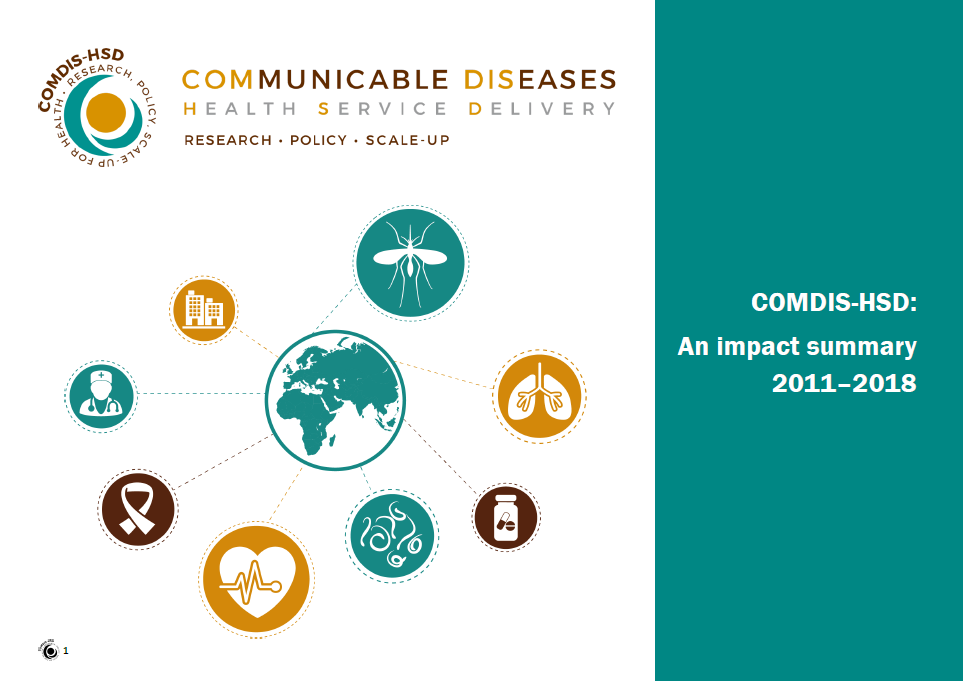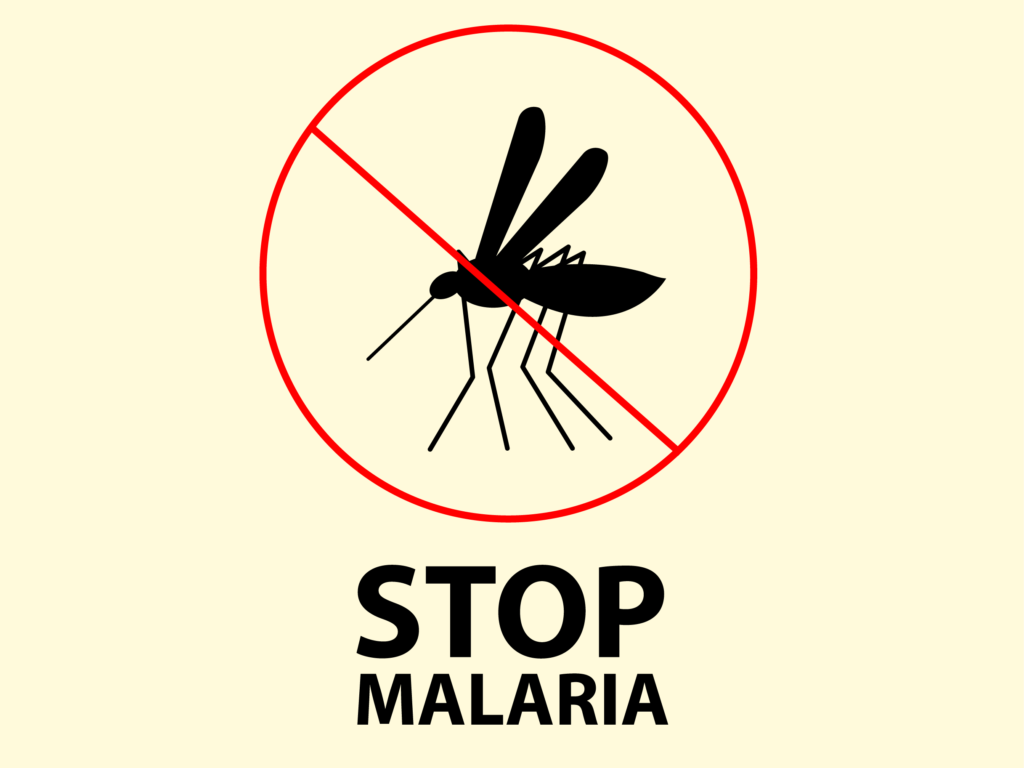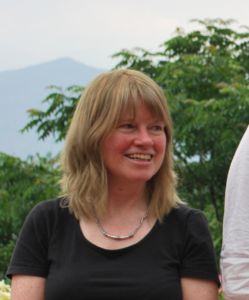
Influencing policy makers and practitioners for better health service delivery
When we originally set up the COMDIS-HSD research programme consortium, our primary intention was to develop research findings that would impact on health policy and practice in our partner countries and beyond. Our aim was to make a difference to the health and lives of many millions of people living in low- and lower middle-income countries (LMICs), and particularly the poorest of those people. This meant moving beyond long-standing and traditional approaches of relying on academic publications to influence others; academic publications were merely a step on the road, rather than the end of the journey.
We are pleased to report that we have met this aim. We have successfully influenced national or wider policy in the fields of antimicrobial resistance, malaria, tuberculosis, HIV, neglected tropical diseases and urban health. Our work focuses on health services delivery (as the HSD in our consortium name emphasises) as we are convinced that many of the health care problems (in the widest sense) in LMICs can be solved by better delivery of existing health care approaches. There must be a balance between discovering new drugs and techniques, and ensuring the people who need drugs and techniques get them. In our view, funding is too heavily skewed towards the former, and we are grateful to DFID for awarding us the funding to allow us to contribute to improving the balance.
Helping to build sustainable and resilient NGO partners
Perhaps the chief contributor to the success of COMDIS-HSD is our NGO partners and their research teams. We should not underestimate the scale of the efforts a small number of individuals have made to create what are now influential national NGOs; and the strengths of the resultant networks of researchers, research uptake staff, support staff and government counterparts. We would like to congratulate the heads of our NGO partners for having the courage, vision and drive to invest in building responsive and resilient research organisations. These NGOs are now sustainable in their own rights, with multiple research partners outside the COMDIS-HSD consortium, and proven abilities to generate substantial research and development funding and deliver a return on that investment. Importantly, they have over many years developed the close links with policy-makers and practitioner groups that are necessary to make sure that research findings are translated into policy and practice in their respective countries.
Our embedded approach
 We have found that a major contributor to COMDIS-HSD’s ability to deliver research that leads to changes in policy and practice is our use of an embedded research and development approach. In brief, this entails ensuring research addresses national priorities and delivers policy-relevant findings; interventions are designed from the outset to be sustainable and scalable; intervention design is heavily influenced by research with potential users – both health care staff and patients/members of the general public – and includes development of all relevant materials and guides, including training materials and processes; after piloting and review, interventions are tested in routine conditions, unsupported by external staff or resources; the research team works with policy-makers to translate research findings into policy; and then uses the materials and guides to run the initial training-of-trainer programmes. In the longer term, we would like to further monitor and evaluate uptake at scale. The consortium’s capacity to carry out embedded research and development stems from an ongoing collaboration between our national NGO partners with skills in research and evidence-led advocacy, and an international research team at the University of Leeds and Malaria Consortium, with skills in advanced research methods and capacity development.
We have found that a major contributor to COMDIS-HSD’s ability to deliver research that leads to changes in policy and practice is our use of an embedded research and development approach. In brief, this entails ensuring research addresses national priorities and delivers policy-relevant findings; interventions are designed from the outset to be sustainable and scalable; intervention design is heavily influenced by research with potential users – both health care staff and patients/members of the general public – and includes development of all relevant materials and guides, including training materials and processes; after piloting and review, interventions are tested in routine conditions, unsupported by external staff or resources; the research team works with policy-makers to translate research findings into policy; and then uses the materials and guides to run the initial training-of-trainer programmes. In the longer term, we would like to further monitor and evaluate uptake at scale. The consortium’s capacity to carry out embedded research and development stems from an ongoing collaboration between our national NGO partners with skills in research and evidence-led advocacy, and an international research team at the University of Leeds and Malaria Consortium, with skills in advanced research methods and capacity development.
As a consortium, we believe that we have achieved much over 8 years. We would like to thank all our supporters at the various ministries, hospitals, rural health facilities, technical working groups, and beyond, for helping us to collectively make a difference. We would also like to thank our Consortium Advisory Group, DFID and all our critical friends for their guidance, clarity and championing of our work and of the embedded approach to research and development.
We hope you enjoy reading about our work and our impact. Rest assured that our work continues through our NGO partners ARK Foundation in Bangladesh; Association for Social Development in Pakistan; HERD International in Nepal; Good Shepherd Hospital in Eswatini (formerly Swaziland); Malaria Consortium across Africa and Asia; and the University of Leeds in the UK.
Prof James Newell and Prof John Walley
Co-directors, COMDIS-HSD
Tag Archives: Malaria Consortium
Commonwealth leaders commit to halving malaria cases in 5 years
 Leaders of the 53 commonwealth countries have committed to halving the number of cases of malaria in their countries by 2023.
Leaders of the 53 commonwealth countries have committed to halving the number of cases of malaria in their countries by 2023.
If achieved, this will result in 650,000 lives saved and prevent 350 million cases of malaria.
The announcement was made at the Malaria Summit London, held during the Commonwealth Heads of Government Meeting, where £2.9 billion ($4.1 billion) was pledged to tackle the disease. Co-hosted by the Governments of Rwanda, Swaziland and the United Kingdom, key speakers included His Royal Highness the Prince of Wales, Bill Gates, and the Director General of the World Health Organization, Dr Tedros Adhanom Ghebreyesus.
Delegates were made up of leaders from 19 Commonwealth countries, scientists, heads of business and civil society advocates.
Leaders also urged that efforts should be accelerated to reduce malaria globally by 90% by 2030.
Malaria affects 90% of citizens living in commonwealth countries and accounts for half of all global cases and deaths from malaria. In 2016, 46% of global malaria deaths occurred in eight Commonwealth countries, half of which were in Nigeria.
Speaking after the summit, Charles Nelson, chief executive of Malaria Consortium, said:
“The commitments announced today represent an important step towards mobilising the resources we need to drive progress against malaria.
“As well as increasing investments for malaria, both across the Commonwealth and beyond, we also need a smarter, more targeted approach to how we fight the disease. By investing in disease surveillance systems and strengthening the collection, analysis and use of data, malaria interventions can be more targeted, outbreak responses can be more rapid, and as a result, the impact of our work can be much greater.”
Our Malaria research
COMDIS-HSD has been involved in a number of malaria projects in commonwealth countries.
Our study with the Centre for Global Health Research in Ghana looked at the use of Intermittent Preventative Treatment in children in an area with a long malaria transmission season, and evaluated the use of a longer acting antimalarial for treatment as a means of chemoprevention.
It revealed convenient access to seasonal malaria chemoprevention (SMC) drugs, including door-to-door delivery by trusted community health workers, makes SMC more acceptable to caregivers and leads to better adherence. By extending SMC from the usual 3 months to 5 months, it can significantly reduce the burden of malaria in areas with longer rainy seasons.
Read our research brief on extended seasonal malaria chemoprevention in Ghana.
Watch our video brief on seasonal malaria chemoprevention in children under 5 years.
Working with Malaria Consortium, our study in Uganda aimed to increase the uptake of intermittent preventive treatment for malaria in pregnancy (IPTp).
It revealed that text messaging improved health worker knowledge of IPTp and increased IPTp coverage. As a result, the Ministry of Health in Uganda adopted a text messaging approach for health worker education and learning in its national malaria in pregnancy training strategy.
Read our research brief on introducing an mHealth pilot intervention in West Nile, Uganda.
As part of the same project, we identified barriers to two-dose intermittent preventive treatment (IPT2) in pregnancy in Uganda, offering a number of key recommendations, including the development of a job aid for health workers and the introduction of computerised recording and reporting systems at health facilities.
Read our research brief on assessing and addressing barriers to IPT2 uptake in Uganda.
James Newell, COMDIS-HSD Co-Director, reflects on our impact and influence in 2017

Here at COMDIS-HSD, we’ve been reflecting on our impact and influence in 2017, which began with a 2-year extension to continue some of our work. Our review of 2017 showcases our influence and work in Bangladesh, China, Nepal, Pakistan and Swaziland – I hope you enjoy reading about some of our successes in TB, malaria, antibiotic resistance, gender and open access.
I’d also like to thank all our partners for their great work and support in developing and initiating this work, including, but not restricted to:
- international and government partners for working with us to identify research questions of global importance
- COMDIS-HSD research partners for developing and carrying out the research and working closely with government and other partners
- the team in Leeds for providing research, communication and operational support
- Consortium Advisory Group members for guidance and support
- Colleagues at DFID for providing funding and supporting us in navigating new DFID requirements.
All this input means we have been able to continue to develop and assess strategies that are designed to be appropriate for context, scalable and sustainable, and that over the years have helped improve the health of millions of people in our study countries and beyond.
![]() I am particularly excited by three new areas of work: 1) hepatitis prevention and care; 2) psychosocial support to people with MDR-TB; and 3) improving health care, particularly for communicable diseases, in urban areas. Although time is tight, we aim to deliver findings in these areas that will guide national and disease control programmes and international bodies by providing feasible and practical solutions to these major problems.
I am particularly excited by three new areas of work: 1) hepatitis prevention and care; 2) psychosocial support to people with MDR-TB; and 3) improving health care, particularly for communicable diseases, in urban areas. Although time is tight, we aim to deliver findings in these areas that will guide national and disease control programmes and international bodies by providing feasible and practical solutions to these major problems.
 I am also delighted to welcome Libby Clark, our newly appointed Consortium Manager, to the team. Libby comes to us with a wealth of programme management experience coupled with a background in gender and development – a great fit for our consortium.
I am also delighted to welcome Libby Clark, our newly appointed Consortium Manager, to the team. Libby comes to us with a wealth of programme management experience coupled with a background in gender and development – a great fit for our consortium.
I’d like to end by thanking everyone involved for their continuing support. We look forward to reporting on our impact in these areas of work in 2018.
Our tribute to Sylvia Meek: inspiration, powerhouse and dear friend

Sylvia Meek , Malaria Consortium’s Global Technical Director and member of COMDIS-HSD’s advisory group and executive committee for many years.
We were very saddened at COMDIS-HSD to hear about the death of our dear friend and colleague Sylvia Meek, Malaria Consortium’s Global Technical Director. She had an enormous presence within our consortium and her loss has been felt greatly among us. For over 10 years, Sylvia mentored and advised us with a clarity and insight that we all admired.
Prof Xiaolin Wei, the director of our research in China said, “I am so sorry to hear about Sylvia’s death. Sylvia has been one of the best friends, leaders and mentors for us at COMDIS. It is such a big loss to us both emotionally and professionally.”
Her guiding hand was a sentiment echoed by Dr Amir Khan, director of our partner organisation in Pakistan: “We will always remember Sylvia as a source of inspiration and guidance for the public health work that we have done during the last decade.”
Sylvia played an important role in our Consortium Advisory Group and Executive Committee. Prof Tony Harries, our Advisory Group Chair, said: “It was always a great pleasure to have Sylvia at the annual CAG meetings – she was always very informative about her subject areas, gave very sensible advice on strategy and direction and was at the same time very nice and always friendly. We will miss her.”
Even in the last 18 months, when she wasn’t able to travel to our annual meetings, her wisdom and sharp insight cut through our discussions to remind us that we had to focus, to be inclusive, to work together; all this over Skype or speakerphone. Her presence was palpable no matter the distance.
Prof John Walley, Co-Director of COMDIS-HSD worked with her for over a decade. “Sylvia was a powerhouse behind the control of malaria. My favourite memory was, at our annual partner meeting near Athens, we visited a temple and sat on a beach, and tried not to talk about work. She was a lovely warm person, so much fun to be with, and a dear friend.”
Personally, I feel very privileged to have known and worked with Sylvia, she was an inspiration. It doesn’t seem right that someone with such an exceptional contribution to make should be taken from us. She was so dedicated and COMDIS-HSD has been lucky to benefit from her expertise. I’ll miss her guidance and ability to keep us on the straight and narrow – she always had a gentle way of challenging issues and presenting a different perspective. She leaves a huge gap in so many ways, which I feel sure cannot be filled. The scholarship set up in Sylvia’s honour by Malaria Consortium is a very fitting tribute to a woman with such vision and passion. We’ve lost a unique and special person and she will be truly missed. We offer our sincere condolences to her family, friends and colleagues.
Anthonia James, Consortium Manager, COMDIS-HSD.
On behalf of COMDIS-HSD partners and friends.
To donate to the Sylvia Meek Scholarship for Entomology, please visit this site set up by Malaria Consortium: https://www.justgiving.com/Malaria-Consortium. If you wish to leave a message of condolence for Sylvia, please send these to messagesforsylvia@gmail.com. These will be seen by Sylvia’s family and Malaria Consortium.
COMDIS-HSD reflections on ResUpMeetUp symposium and training
 COMDIS-HSD was well represented at the recent ResUpMeetUp symposium and training, with attendees from Nepal (HERD), China (Global Health Research and Development) and Uganda (Malaria Consortium). Sudeep Uprety (HERD) presented a paper on strengthening the media’s response to urban health issues in Nepal. Badru Gidudu Walimbwa (Malaria Consortium) also presented a paper on assessing and addressing barriers to IPTp uptake in Uganda. Both presentations were very well received. Read the reflections on this workshop from our 3 attendees here.
COMDIS-HSD was well represented at the recent ResUpMeetUp symposium and training, with attendees from Nepal (HERD), China (Global Health Research and Development) and Uganda (Malaria Consortium). Sudeep Uprety (HERD) presented a paper on strengthening the media’s response to urban health issues in Nepal. Badru Gidudu Walimbwa (Malaria Consortium) also presented a paper on assessing and addressing barriers to IPTp uptake in Uganda. Both presentations were very well received. Read the reflections on this workshop from our 3 attendees here.
Zambian ICCM study findings shared at ICCM London Symposium
Malaria Consortium recently shared findings from their Zambian Integrated Community Case Management study at their ICCM Symposium in London. The symposium was attended by representatives of the Ugandan Ministry of Health, UNICEF, and the London School of Hygiene and Tropical Medicine. Presentations and discussions focused on Malaria Consortium’s longest running ICCM programme and its effectiveness and impact on the health of children under five.
The symposium was broadcast live online, and you can view each presentation separately here. You can also download each presentation here.
Dr Kirstie Graham talks to The Guardian about ICCM
In the second of a series of 3 articles, Dr Kirstie Graham of Malaria Consortium takes part in a short Q&A on the malaria and infectious diseases hub of The Guardian website. The COMDIS-HSD study in Zambia looks at how to promote the ‘rational use’ of antibiotics using one form of intervention that is increasingly being used to reduce child mortality in rural Africa: Integrated Community Case Management (ICCM). The Q&A covers why the ‘rational’ use of antibiotics is so important, as well as the link between ICCM and the rational use of antibiotics.
In the first article, Kirstie outlined why antibiotic resistance is ‘a ticking time bomb for public health’.
The ticking time bomb of antibiotic resistance
In the first of a series of 3 articles, Dr Kirstie Graham of Malaria Consortium outlines why antibiotic resistance is ‘a ticking time bomb for public health’. She introduces the issue of antibiotic drug resistance, including its spread and its effect on child mortality. Malaria Consortium has been conducting research in Zambia to understand the use of antibiotics at community level, and aim to use their research findings to better inform action in countries implementing Integrated Community Case Management (ICCM). ICCM is one form of intervention that is increasingly being used to reduce child mortality in rural Africa.
The second article will focus more on the study itself and the final article will detail some of the study findings.




